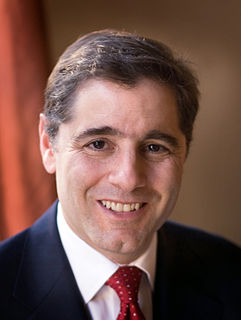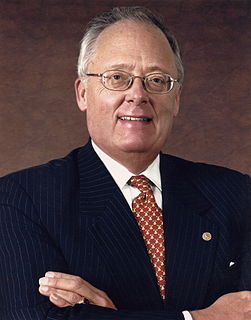A Quote by Julius Genachowski
In general, I found that the more that debates can be about facts and data, the more likely government is to make sound decisions that benefit innovators and the American people.
Related Quotes
We will continue to work with agencies across the government to unleash the power of open data and to make government data more accessible and usable for entrepreneurs, companies, researchers, and citizens everywhere - innovators who can leverage these resources to benefit Americans in a rapidly growing array of exciting and powerful ways.
Incivility is a symptom, not the disease. We've always had partisan conflict in Congress, and we always will. Yet when I worked for a year (1970-71) on the staff of Sen. Ed Muskie of Maine, this was a different place, more collegial, more sensitive to data, more concerned about all of the American people. I think because the for-profit media prizes conflict above cooperation and sound bites above analysis, politicians have learned to adapt to those tendencies. Consequently, our public debates are dumbed down as our problems grow more complex.
There are studies that have shown that we make decisions, ethical and otherwise, based on the way we imagine ourselves as characters in the stories of our lives. In other words, if we imagine ourselves brave or crazy or open, we're more likely to make decisions in a given situation based on how we imagine ourselves, whatever the facts may be.
Our common stock of words embodies all the distinctions men have found worth drawing, and the connexions they have found worth marketing, in the lifetimes of many generation; these surely are likely to be more numerous, more sound, since they have stood up to the long test of thee survival of the fittest, and more subtle, at least in all ordinary and reasonably practical matters, than any that you or I are likely to think up in our arm-chairs of an afternoon-the most favoured alternative method.
Poorly planned and stressful vacations eliminate the positive benefit of time away. The less the stress, the more likely you will experience a positive benefit from the time off. A positive, well-managed vacation can make you happier and less stressed, and you can return with more energy at work and with more meaning in your life.
The media is an ally when it comes to showing the truth about terrorist groups. Attacking the media will not produce a more compliant citizenry. It will produce a more alienated, suspicious and disenfranchised public, one more likely to chafe under a government's attempts at control, all to the benefit of terrorist groups.
No decision-making system is going to guarantee corporate success. The strategic decisions that corporations have to make are of mind-numbing complexity. But we know that the more power you give a single individual in the face of complexity and uncertainty, the more likely it is that bad decisions will get made.
Is the American tradition of self-reliance disappearing? That's a painful question for conservatives to ponder. After all, we're dedicated to reducing the role of government and promoting individual freedom and opportunity. But the facts, while sad, are clear: More Americans today depend more heavily on government than ever before.


































